Here’s a scenario every sales (and marketing) professional knows all too well. Marketing delivers thousands of new leads every month, but sales feels only a tiny fraction are worth pursuing. Most either lack buying intent or aren’t qualified enough to be worth their time. On the surface, engagement rates are up, conversion metrics are climbing, but sales reps are stuck wondering: which prospects are serious buyers, which ones need nurturing, and which ones are just casually browsing?
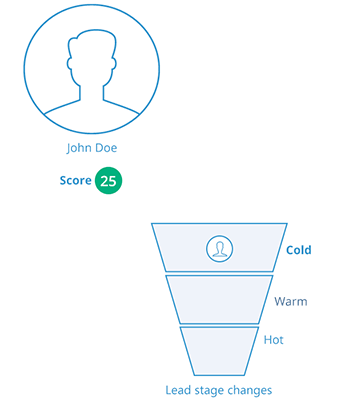
A great deal of time is spent on leads that “just might” be interested. Meanwhile, the really interested buyers with approved budgets and genuine intent to purchase get lost in the shuffle. After a week, when they finally receive a call, they’ve probably already moved on. This is where AI lead scoring changes the game – helping teams prioritize the right prospects, shorten sales cycles, and boost conversions by upto 30%.
So, what is AI lead scoring?
Think of it as an evolution of the traditional lead qualification. Traditional lead scoring primarily relied on static attributes with behavioral assumptions about the buyer.
Teams would often debate endlessly whether a director should score higher than a VP, or if the act of downloading a whitepaper indicates a higher level of interest than attending a webinar. Most of these choices were not grounded in analytics-driven truths about the buying process but rather mirrored the biases of the people making them.
AI changes that.
Instead of sticking to set criteria, it sifts through tons of historical data to spot the patterns that are often invisible to people. The procedure examines multiple data points at the same time which can refer to such particulars as company size and income, social activity, job titles, live engagement, or even the sequence of events in which someone interacts with your company.
When an AI system interacts with a new prospect, it not only gathers data but also refines its understanding of the key signals that indicate the likelihood of a purchase. Each new lead is compared against thousands of conversions or non-conversions, generating a score that reflects the real closure probability – not just a number pulled from arbitrary assumptions.
The potency of using AI for predictive lead scoring lies in its ability to detect subtle correlations that are almost indiscernible for humans.
For instance, the system may uncover that prospects who visit the pricing page before the product overview page convert 40% more often.
How AI lead scoring works
AI systems use machine learning algorithms to automatically evaluate, and order leads according to the likelihood of them being of value to the business.
1. Information collection and pattern recognition
AI-led lead scoring platforms begin with the collection of data from various sources within the company.
- Customer Relationship Management (CRM) systems: Hold details on previous sales interactions and conversion rates.
- Marketing automation tools: Offer campaign responses and engagement analytics.
- Website statistics: Indicate the preferences of the users and their browsing habits.
- Social media monitoring: Gives information about the changes in personnel and the way the business is run.
- E-commerce transaction data: Purchase histories, shopping cart behavior, product returns, and average order value help identify high-value customers and predict repeat purchases.
- Mobile app usage patterns: In-app activity, feature adoption, and push notification responses reveal consumer engagement and likelihood to convert or churn.
- Customer service interactions (chatbots, call centers, helpdesk logs): Useful to detect pain points or churn risk.
The system does not use the customer actions alone; it rather understands the whole context of the action.
Next, the AI applies complex algorithms to select features and activities that are the best indicators of successful conversion. The process, which is often called feature engineering, quite often results in surprising discoveries.
2. Training models and continuous learning
AI trains predictive models by looking at past data – from prospects that became customers and from those who didn’t. To increase accuracy and lower the possibility that any one method may introduce blind spots, advanced systems use ensemble approaches, which combine several algorithms.
But the learning doesn’t stop here. As new sales results come in, the AI keeps refining itself. If prospects with certain traits consistently convert, the system weighs those traits more heavily. If high-scoring leads fail to close, it adjusts accordingly. Over time, AI-based lead scoring becomes smarter, more accurate, and more aligned with real-world buyer behavior.
This self-improving loop means the system adapts naturally to shifts in customer preferences, new product launches, seasonal promotions, or even changes in the market – without needing manual rule updates or human intervention.
3. Real-time lead scoring and updates
After training, the AI keeps monitoring new interactions and updates scores instantly. Instead of waiting for batch processing, a lead’s score is refreshed the moment they take action — like attending a webinar, downloading a pricing guide, or sharing product details with colleagues.
This responsiveness lets sales teams act while interest is at its peak. Within minutes of a key event, reps get notified and can engage prospects right away, rather than hours or days later when attention may have shifted to competitors or other priorities.
Benefits of AI lead scoring
Organizations implementing AI lead scoring consistently experience dramatic improvements across multiple critical business metrics:
1. Enhanced sales efficiency
AI helps sales teams work smarter by highlighting the leads most likely to convert. Instead of reaching out to every contact, reps can focus their time on high-potential prospects.
This targeted approach often doubles the number of valuable conversations per day. These discussions tend to be with prospects who show real buying intent — asking specific questions, requesting details, and actively exploring solutions — rather than casual browsers.
2. Smarter qualification and lasting productivity gains
AI scoring cuts the time reps spend on initial qualification by 30–40% since it flags the most promising prospects upfront. This frees teams to focus on deeper discovery calls, more product demos, and moving real opportunities through the pipeline.
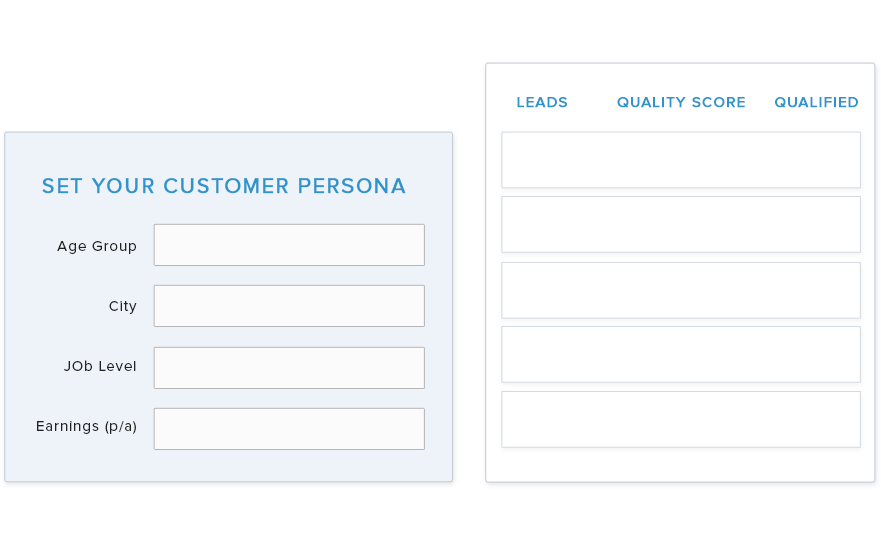
Over time, these gains add up. Reps build stronger relationships with serious buyers and sharpen their ability to spot true purchase signals. With less wasted effort, sales professionals report higher job satisfaction, as their daily work leads to visible, meaningful results.
3. Improved conversion rates
AI-powered lead scoring pinpoints the prospects most likely to buy, helping sales teams convert at much higher rates throughout the funnel. A 2024 Deloitte Insights research claims that companies who used AI for lead scoring and targeting experienced a 20–30% rise in conversion rates.
These gains translate into real business impact: organizations typically report 10–20% revenue growth in the first year, while also cutting 60–80% of lead qualification costs. By focusing on genuine purchase intent and engaging prospects at the right moment, teams drive stronger results with less wasted effort.
4. Better marketing ROI
AI lead scoring gives marketing teams clear visibility into what truly drives revenue—not just surface-level engagement. Instead of relying on vanity metrics like downloads or lead counts, marketers can see which channels and content types generate high-value prospects that actually convert.
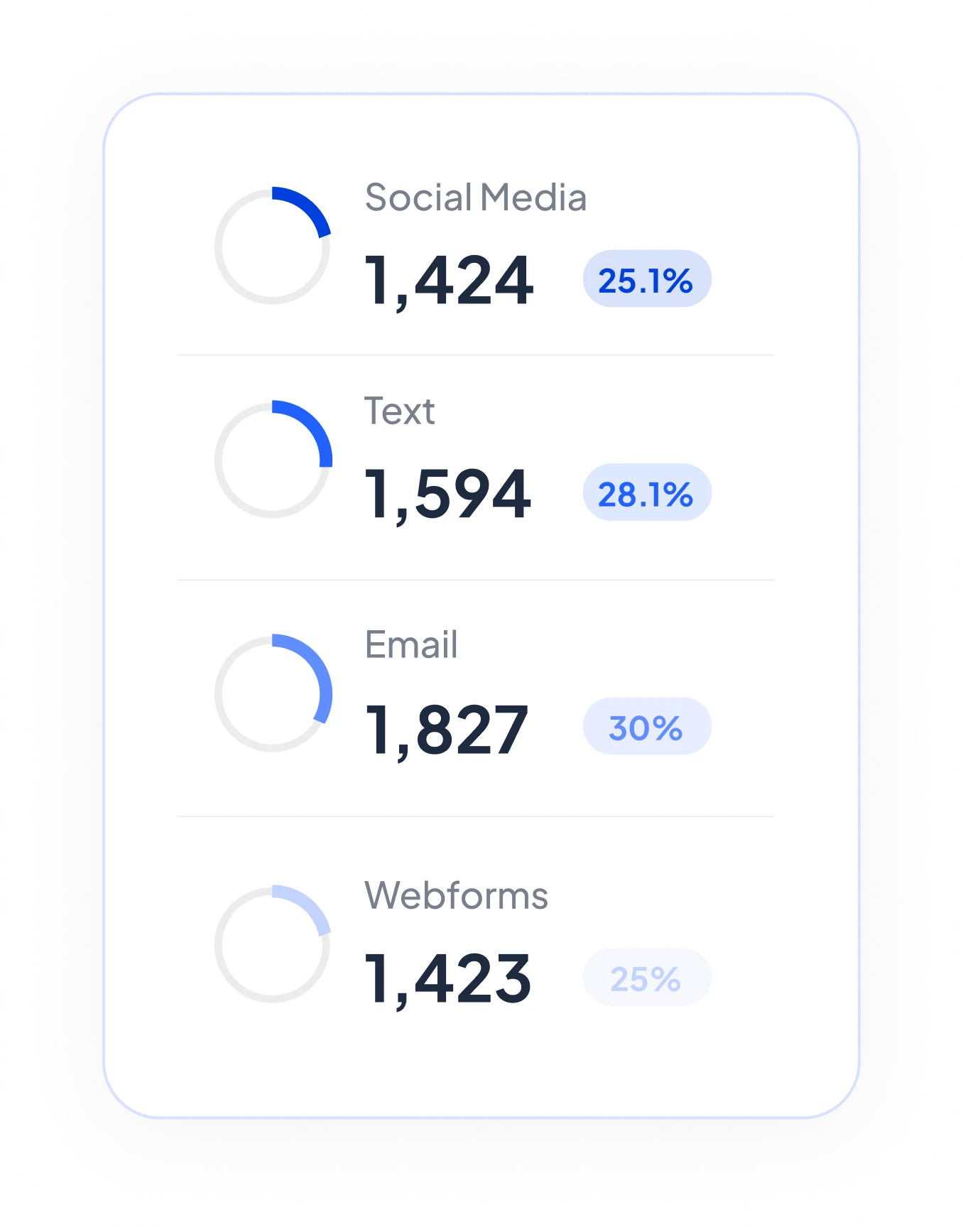
This insight transforms strategy. Budgets shift from raw lead volume to revenue impact, content teams double down on materials that move buyers forward, and campaigns become more personalized. Prospects receive tailored messaging based on their behaviors and preferences, boosting response rates while reducing wasted spend.
The result: marketing investment flows to proven, revenue-generating activities, typically improving ROI by 35%.
5. Reduced sales cycle length
AI lead scoring helps separate ready-to-buy prospects from those who need more nurturing. Sales teams can then tailor their approach: fast-tracking high-intent leads through demos and proposals, while guiding less-ready prospects through nurturing sequences until they’re sales-ready.
This dual-track approach reduces overall sales cycle times by 20–40%, since reps focus their energy where momentum already exists without neglecting future opportunities.
It also improves forecast accuracy. With clearer visibility into prospect readiness and closing timelines, sales managers can plan territories, set quotas, and allocate resources more effectively.
Now, let’s talk about tools and what to look for.
Key features to look for in AI lead scoring tools
Success requires platforms built for complex business needs.
1. Advanced machine learning capabilities
The best platforms use cutting-edge machine learning to handle large volumes of data and deliver accurate predictions across different markets and prospect types.
- Ensemble methods: Combine multiple algorithms for reliable performance across industries, regions, and prospect behaviors—even in unusual cases.
- Deep learning: Detects complex patterns in large datasets with millions of interactions that traditional analysis would miss.
- Natural language processing (NLP): Interprets sentiment and intent in emails, chats, and social media, which is vital as buying shifts online.
- Continuous learning: Models update automatically with new data and feedback, keeping predictions accurate over time without manual effort.
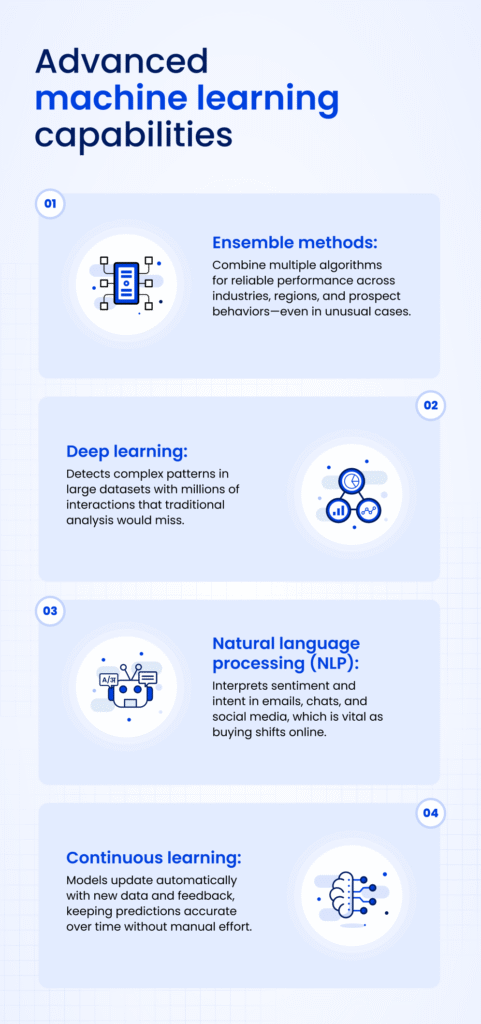
2. Comprehensive data integration
Effective AI lead scoring requires seamless access to information across multiple organizational systems and departments.
- Platforms should integrate natively with CRM systems like LeadSquared, Salesforce, HubSpot, and Microsoft Dynamics, ensuring that scoring information appears directly within familiar workflows rather than requiring separate applications.
- Marketing automation connectivity with platforms like LeadSquared, Marketo, HubSpot, Eloqua, and Pardot enables comprehensive prospect tracking across all marketing touchpoints; while maintaining data consistency between different systems and preventing information gaps.
- Website analytics integration provides crucial behavioral insights about how prospects interact with content, navigate through product information, and demonstrate purchase intent through their browsing patterns and engagement activities.
- Social media monitoring adds valuable context about company activities, personnel changes, and market positioning that can significantly influence purchase timing and decision-making processes.
- Customer support system integration includes service interaction data that adds crucial context about prospect experience and satisfaction levels that traditional marketing and sales data cannot provide.
3. Real-time scoring and updates
Leading AI platforms update scores instantly as prospects engage across channels. Sales teams get immediate alerts when leads hit key thresholds, so they can act while interest is strongest.
Prospects are automatically segmented based on behaviors and readiness, allowing tailored marketing and sales approaches.
With full mobile access, field reps and remote teams can tap into these insights anytime, ensuring quick, informed engagement wherever they are.
4. Transparency and customization
Even though AI scoring is complex, platforms should make the logic clear. Detailed breakdowns show which factors drive a prospect’s score and how those factors change over time.
Top systems explain why scores rise or fall, helping sales teams distinguish real buying intent from casual interest.
They also allow customization—adjusting factor weights, building models for different products or segments, and adding industry-specific insights that generic tools can’t match.
Top AI lead scoring tools in 2026
The AI lead scoring landscape offers several sophisticated platforms designed for different organizational needs and technical requirements.
1. Mid-market and specialized solutions
LeadSquared – Unified CRM with AI-powered lead scoring
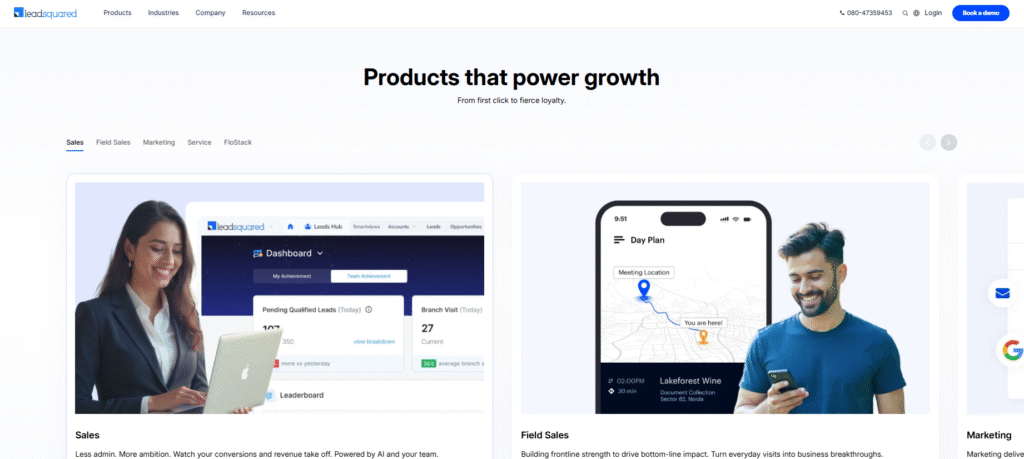
LeadSquared stands out as a comprehensive customer relations management platform that excels in AI-powered lead scoring while providing robust marketing automation and sales CRM capabilities in a unified system. Unlike tools that need multiple integrations, LeadSquared offers AI scoring as a built-in feature, enhancing the core CRM experience instead of acting as a separate add-on.
Its AI engine continuously analyzes behavior, demographics, and interaction history to deliver real-time, dynamic scores. Sales teams can see not only current scores but also trends and the specific factors driving each score—all within their regular CRM workflows.
A key strength is industry-specific optimization. Pre-configured models for education, healthcare, financial services, real estate, insurance, and other complex sectors account for unique behaviors, compliance needs, and long sales cycles—offering accuracy that generic platforms can’t match.
6sense’s AI-based lead scoring
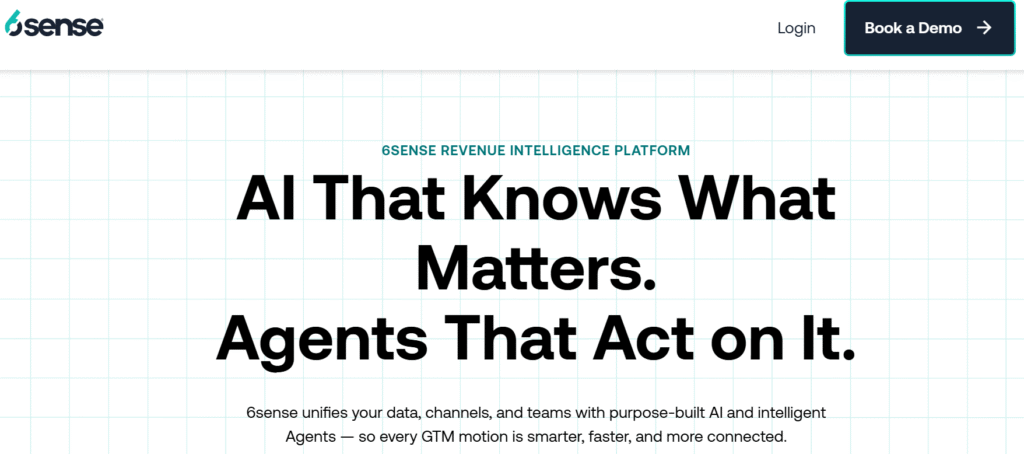
6sense offers account-based orchestration with AI-driven lead and account scoring. The platform excels at identifying in-market accounts and timing engagement strategies effectively, making it valuable for companies with sophisticated account-based marketing programs.
2. Enterprise-level solutions
LeadSquared’s AI Capabilities
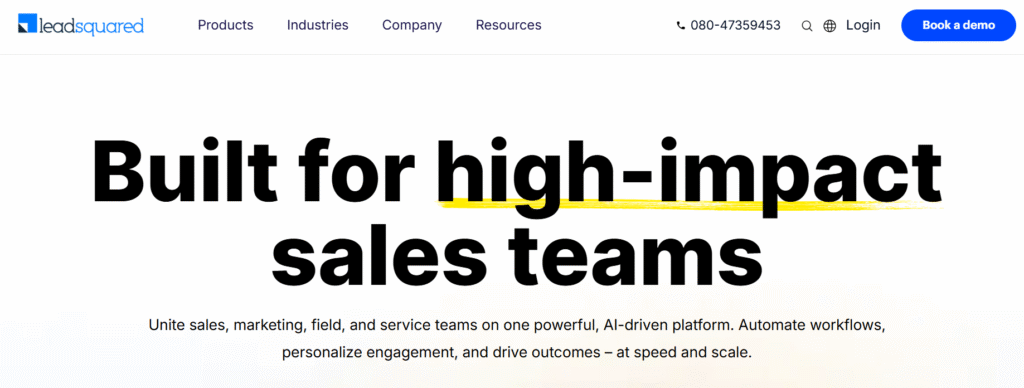
LeadSquared also serves enterprise organizations with its unified CRM, marketing automation, and AI-powered lead scoring capabilities. Its AI engine delivers real-time, dynamic scores while providing deep visibility into contributing factors and trends—seamlessly within CRM workflows.
For large enterprises, LeadSquared’s industry-specific optimization is a key differentiator. Pre-configured models for education, healthcare, financial services, insurance, and other regulated sectors help global teams manage complex sales cycles and compliance requirements at scale.
Salesforce Einstein Lead Scoring
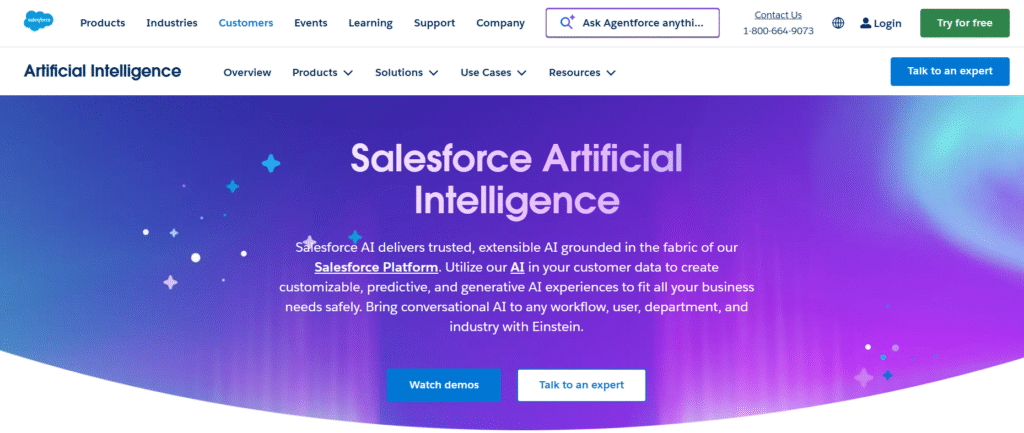
Salesforce Einstein leverages Salesforce’s extensive data ecosystem to provide predictive lead scoring integrated directly into existing CRM workflows. This solution works particularly well for organizations already heavily invested in Salesforce and seeking to enhance existing processes rather than implementing new systems.
HubSpot Predictive Lead Scoring
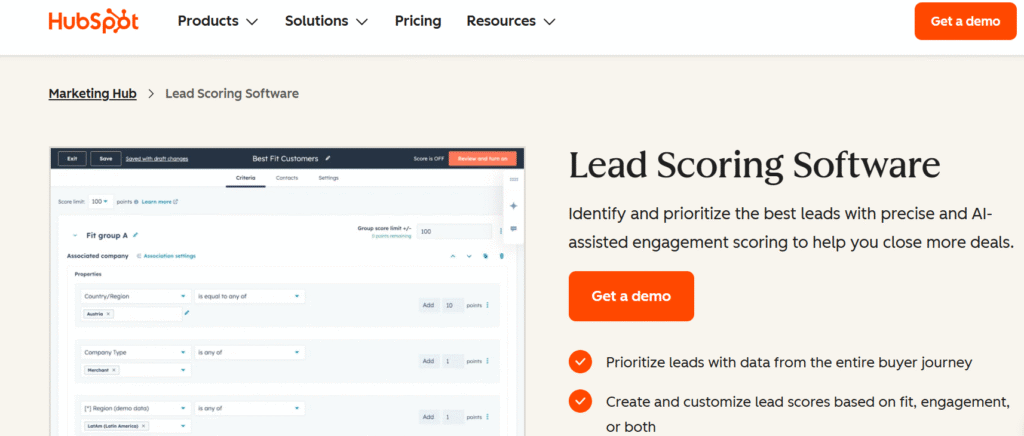
HubSpot Predictive Lead Scoring offers machine learning-powered scoring as part of HubSpot’s comprehensive inbound marketing and sales platform. The tight integration with content marketing efforts provides additional context that enhances scoring accuracy, making it attractive for companies emphasizing content-driven lead generation strategies.
Microsoft Dynamics 365 AI’s approach
Microsoft Dynamics 365 AI provides AI-driven insights and lead scoring capabilities within the Microsoft ecosystem. This platform suits organizations heavily invested in Microsoft technologies and seeking seamless integration across business applications.
AI-based lead scoring + CRM integration
Integrating AI lead scoring with existing CRM systems is crucial for maximizing effectiveness and ensuring user adoption. Modern platforms offer seamless integration that enhances established workflows without disrupting proven processes.
Key integration considerations
- AI lead scoring platforms should sync bidirectionally with CRM systems, keeping scores updated in real time while capturing sales feedback to ensure consistent data.
- For sales teams, the experience should be natural and intuitive—scores clearly visible within lead and contact records without extra complexity or training.
- Workflow automation can trigger actions when scores change, such as reassigning leads, shifting them into nurturing campaigns, or escalating high-value opportunities.
- Finally, reporting integration connects scoring insights with CRM analytics, giving leaders business intelligence that ties marketing efforts directly to revenue impact.
LeadSquared’s CRM integration excellence
LeadSquared distinguishes itself by offering native integration between AI lead scoring and comprehensive CRM functionality. Rather than requiring organizations to connect multiple disparate systems, LeadSquared provides a unified platform where AI scoring operates as an integral component of the core CRM experience.
The platform’s AI engine continuously analyzes lead behavior, demographics, and interaction history to provide dynamic scoring that updates instantly as prospects engage with the brand. Sales teams can see not just current scores but also score trends and specific factors contributing to each lead’s rating, all within the familiar CRM interface.

This integrated AI approach eliminates common challenges such as data synchronization issues, user training complexity, and system management overhead while delivering superior lead scoring accuracy and usability.
The future of AI lead scoring
AI lead scoring has moved from an experiment to a must-have capability for organizations serious about sales and marketing performance. Companies using advanced systems see clear competitive advantages—higher conversion rates, greater sales efficiency, and smarter resource allocation that drives measurable growth.
Success depends on choosing the right platform, following best practices, and focusing on continuous improvement rather than quick fixes. Whether you’re just starting or optimizing existing systems, the strategies in this guide provide a roadmap to maximize results.
The businesses that adopt AI lead scoring today will set tomorrow’s standard for sales and marketing excellence. Platforms like LeadSquared make this possible by combining powerful AI scoring with end-to-end CRM features—marketing automation, sales, and service—delivering impact without the complexity of multiple integrations.
See it in action.
FAQs on AI lead scoring
What is AI lead scoring?
AI lead scoring is the process of using artificial intelligence to evaluate and rank leads based on their likelihood to convert. Unlike traditional rule-based scoring, AI models analyze large volumes of historical data, engagement behavior, and intent signals to predict which prospects are most valuable. With platforms like LeadSquared, this means smarter prioritization, less guesswork, and faster conversions.
What is the AI tool for lead scoring?
An AI tool for lead scoring uses machine learning to evaluate leads based on data like demographics, engagement, and past conversions. Instead of manual rules, it predicts which leads are most likely to convert. For example, LeadSquared’s AI engine automatically ranks inquiries, helping sales teams focus on high-potential prospects first.
What is the AI model scoring?
AI model scoring refers to the process of applying a trained AI/ML model to assign predictive scores to leads. The model analyzes historical conversion data, behaviors, and engagement signals to determine lead quality. With solutions like LeadSquared, these models continuously learn and improve, ensuring the scoring stays accurate over time.
What is the AI scoring method?
The AI scoring method relies on predictive analytics. It collects data from multiple touchpoints—ads, forms, calls, emails, or even walk-ins—and applies algorithms to rank leads by conversion likelihood.
How to automate lead scoring?
To automate lead scoring, businesses integrate CRM with AI capabilities. The AI evaluates every new lead automatically and updates scores dynamically as behavior changes. LeadSquared’s CRM, for instance, automates the entire process: capturing inquiries, scoring them with AI, and triggering the right follow-up workflows instantly.
Which is a good lead-scoring software?
A good lead-scoring software is one that adapts to your business model, scales with your growth, and provides actionable scores. LeadSquared is a strong option because it integrates AI scoring with automation—so teams don’t just see scores, they act on them with the right follow-ups at the right time.
How does AI lead scoring work?
AI lead scoring works by training algorithms on past customer and prospect data — such as demographics, interactions, and sales outcomes. The AI then assigns predictive scores to new leads, continuously improving as more data flows in. For example, LeadSquared’s AI engine automatically identifies engagement patterns and updates scores in real time, ensuring sales teams always focus on the leads most likely to enroll or buy.
Why is AI lead scoring important in 2026?
In 2026, customer journeys are more complex, and attention spans shorter. Relying only on manual scoring or outdated rules risks missed opportunities. AI lead scoring delivers agility: it adapts to shifting buyer behavior, integrates signals from multiple touchpoints (ads, calls, chats, walk-ins), and helps teams respond faster.
Give an AI lead scoring example.
Imagine a student inquiry at a career school. AI evaluates their activity—like filling out a form, opening emails, visiting the course page multiple times—and assigns a score of 85/100. This high score tells admissions to reach out immediately. With LeadSquared, this process can be fully automated: the system scores the lead, notifies the counselor, and even triggers a personalized follow-up sequence.








